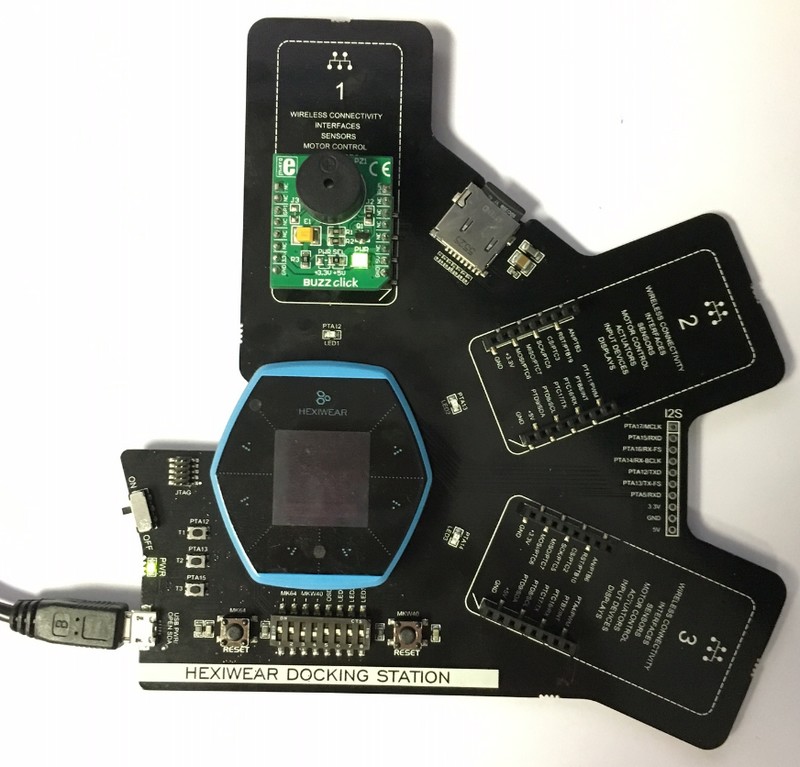Simple Click Buzzer example for Hexiwear
Dependencies: PWM_Tone_Library
This project demonstrates the use of the Mikroelektronika Click Buzzer module with hexiwear
Plug Hexiwear into the Docking Station and the BUZZER Click to the Click Socket 1
Connect the USB cable to your computer and to the micro-USB port of the Docking Station
Compile the project and copy the binary "Hexi_Click_Buzzer_Example_HEXIWEAR.bin" in the DAP-LINK drive from your computer file explorer
Press the K64F-RESET button on the docking station to start the program on your board
The buzzer will start play a melody of 32 tones

Revision 0:13eb53d1b502, committed 2016-09-20
- Comitter:
- GregC
- Date:
- Tue Sep 20 23:21:55 2016 +0000
- Commit message:
- Click Buzzer example for Hexiwear
Changed in this revision
--- /dev/null Thu Jan 01 00:00:00 1970 +0000 +++ b/.gitignore Tue Sep 20 23:21:55 2016 +0000 @@ -0,0 +1,4 @@ +.build +.mbed +projectfiles +*.py*
--- /dev/null Thu Jan 01 00:00:00 1970 +0000 +++ b/PWM_Tone_Library.lib Tue Sep 20 23:21:55 2016 +0000 @@ -0,0 +1,1 @@ +http://developer.mbed.org/users/justinkim/code/PWM_Tone_Library/#d06af372d384
--- /dev/null Thu Jan 01 00:00:00 1970 +0000 +++ b/README.md Tue Sep 20 23:21:55 2016 +0000 @@ -0,0 +1,96 @@ +# Getting started with Blinky on mbed OS + +This is a very simple guide, reviewing the steps required to get Blinky working on an mbed OS platform. + +Please install [mbed CLI](https://github.com/ARMmbed/mbed-cli#installing-mbed-cli). + +## Get the example application! + +From the command line, import the example: + +``` +mbed import mbed-os-example-blinky +cd mbed-os-example-blinky +``` + +### Now compile + +Invoke `mbed compile` specifying the name of your platform and your favorite toolchain (`GCC_ARM`, `ARM`, `IAR`). For example, for the ARM Compiler 5: + +``` +mbed compile -m K64F -t ARM +``` + +Your PC may take a few minutes to compile your code. At the end you should get the following result: + +``` +[snip] ++----------------------------+-------+-------+------+ +| Module | .text | .data | .bss | ++----------------------------+-------+-------+------+ +| Misc | 13939 | 24 | 1372 | +| core/hal | 16993 | 96 | 296 | +| core/rtos | 7384 | 92 | 4204 | +| features/FEATURE_IPV4 | 80 | 0 | 176 | +| frameworks/greentea-client | 1830 | 60 | 44 | +| frameworks/utest | 2392 | 512 | 292 | +| Subtotals | 42618 | 784 | 6384 | ++----------------------------+-------+-------+------+ +Allocated Heap: unknown +Allocated Stack: unknown +Total Static RAM memory (data + bss): 7168 bytes +Total RAM memory (data + bss + heap + stack): 7168 bytes +Total Flash memory (text + data + misc): 43402 bytes +Image: .\.build\K64F\ARM\mbed-os-example-blinky.bin +``` + +### Program your board + +1. Connect your mbed device to the computer over USB. +1. Copy the binary file to the mbed device . +1. Press the reset button to start the program. + +You should see the LED of your platform turning on and off. + +Congratulations if you managed to complete this test! + +## Export the project to Keil MDK and debug your application + +From the command line, run the following command: + +``` +mbed export -m K64F -i uvision +``` + +You should see the following output: + +``` +Successful exports: + * K64F::uvision .\projectfiles\uvision_K64F\Unnamed_Project +``` + +To debug the application: + +1. Start uVision. +1. Import the uVision project generated earlier. +1. Compile your application and generate an `.axf` file. +1. Make sure uVision is configured to debug over CMSIS-DAP (From the Project menu > Options for Target '...' > Debug tab > Use CMSIS-DAP Debugger). +1. Set breakpoints and start a debug session. + + + +## Troubleshooting + +1. Make sure `mbed-cli` is working correctly and its version is greater than `0.8.9` + + ``` + mbed --version + ``` + + If not, you can update it easily: + + ``` + pip install mbed-cli --upgrade + ``` + +2. If using Keil MDK, make sure you have a license installed. [MDK-Lite](http://www.keil.com/arm/mdk.asp) has a 32KB restriction on code size.
--- /dev/null Thu Jan 01 00:00:00 1970 +0000
+++ b/main.cpp Tue Sep 20 23:21:55 2016 +0000
@@ -0,0 +1,67 @@
+#include "mbed.h"
+#include "pwm_tone.h"
+
+PwmOut Buzzer(PTA10);
+
+float C_3 = 1000000/Do3,
+ Cs_3 = 1000000/Do3s,
+ D_3 = 1000000/Re3,
+ Ds_3 = 1000000/Re3s,
+ E_3 = 1000000/Mi3,
+ F_3 = 1000000/Fa3,
+ Fs_3 = 1000000/Fa3s,
+ G_3 = 1000000/So3,
+ Gs_3 = 1000000/So3s,
+ A_3 = 1000000/La3,
+ As_3 = 1000000/La3s,
+ B_3 = 1000000/Ti3,
+ C_4 = 1000000/Do4,
+ Cs_4 = 1000000/Do4s,
+ D_4 = 1000000/Re4,
+ Ds_4 = 1000000/Re4s,
+ E_4 = 1000000/Mi4,
+ F_4 = 1000000/Fa4,
+ Fs_4 = 1000000/Fa4s,
+ G_4 = 1000000/So4,
+ Gs_4 = 1000000/So4s,
+ A_4 = 1000000/La4,
+ As_4 = 1000000/La4s,
+ B_4 = 1000000/Ti4,
+ C_5 = 1000000/Do5,
+ Cs_5 = 1000000/Do5s,
+ D_5 = 1000000/Re5,
+ Ds_5 = 1000000/Re5s,
+ E_5 = 1000000/Mi5,
+ F_5 = 1000000/Fa5,
+ Fs_5 = 1000000/Fa5s,
+ G_5 = 1000000/So5,
+ Gs_5 = 1000000/So5s,
+ A_5 = 1000000/La5,
+ As_5 = 1000000/La5s,
+ B_5 = 1000000/Ti5;
+
+int tones[] = {E_4, D_4, C_4, D_4, E_4, E_4, E_4, 0, D_4, D_4, D_4, 0, E_4, G_4, G_4, 0,
+ E_4, D_4, C_4, D_4, E_4, E_4, E_4, 0, D_4, D_4, E_4, D_4, C_4, 0, 0, 0};
+int tones_num = 32; // Auto performance
+
+
+int i;
+
+// main() runs in its own thread in the OS
+// (note the calls to Thread::wait below for delays)
+int main() {
+
+ Tune(Buzzer, C_4, 4); //4 Octave C beat 4/16
+ wait_ms(250);
+ Tune(Buzzer, D_4, 4); //4 Octave D beat 4/16
+ wait_ms(250);
+ Tune(Buzzer, E_4, 4); //4 Octave E beat 4/16
+ wait_ms(250);
+
+ for(i=0; i<tones_num; i++)
+ {
+ Auto_tunes(Buzzer, tones[i], 4); // Auto performance
+ Stop_tunes(Buzzer);
+ }
+}
+
--- /dev/null Thu Jan 01 00:00:00 1970 +0000 +++ b/mbed-os.lib Tue Sep 20 23:21:55 2016 +0000 @@ -0,0 +1,1 @@ +https://github.com/ARMmbed/mbed-os/#21dd7008a1540c02150f1b87c12294301db979bb